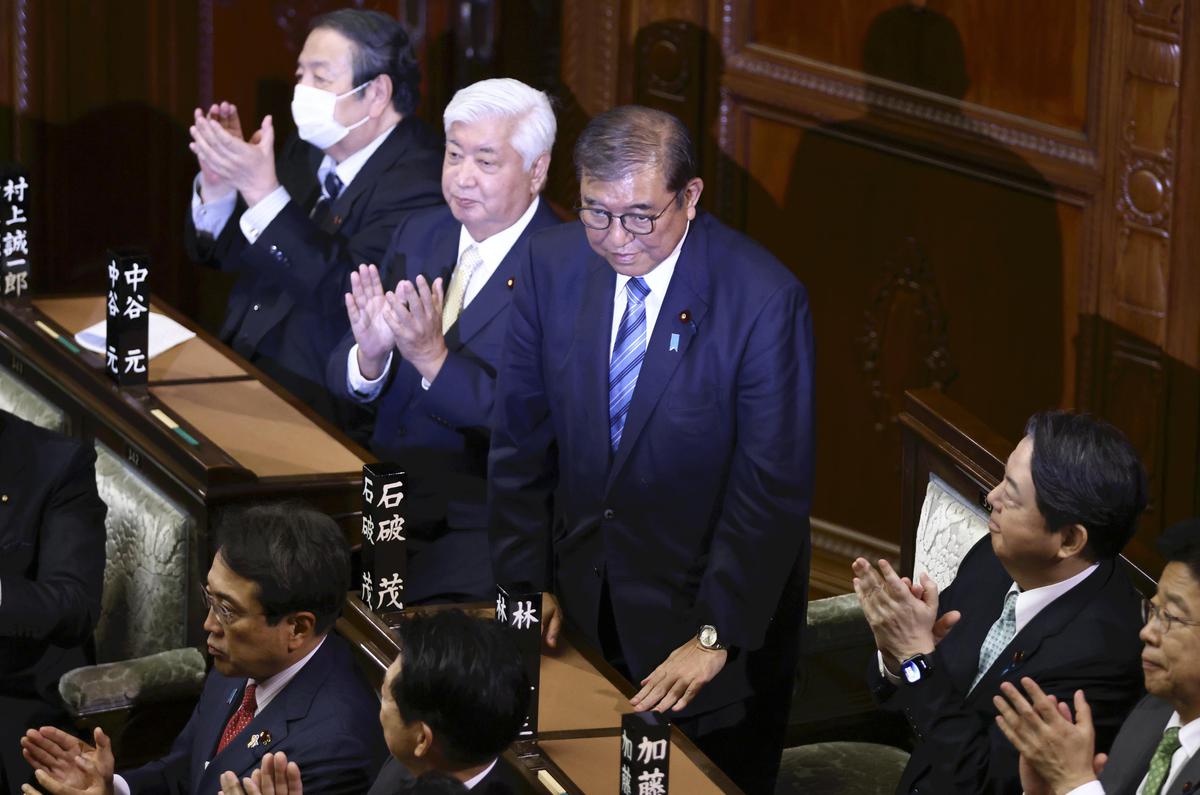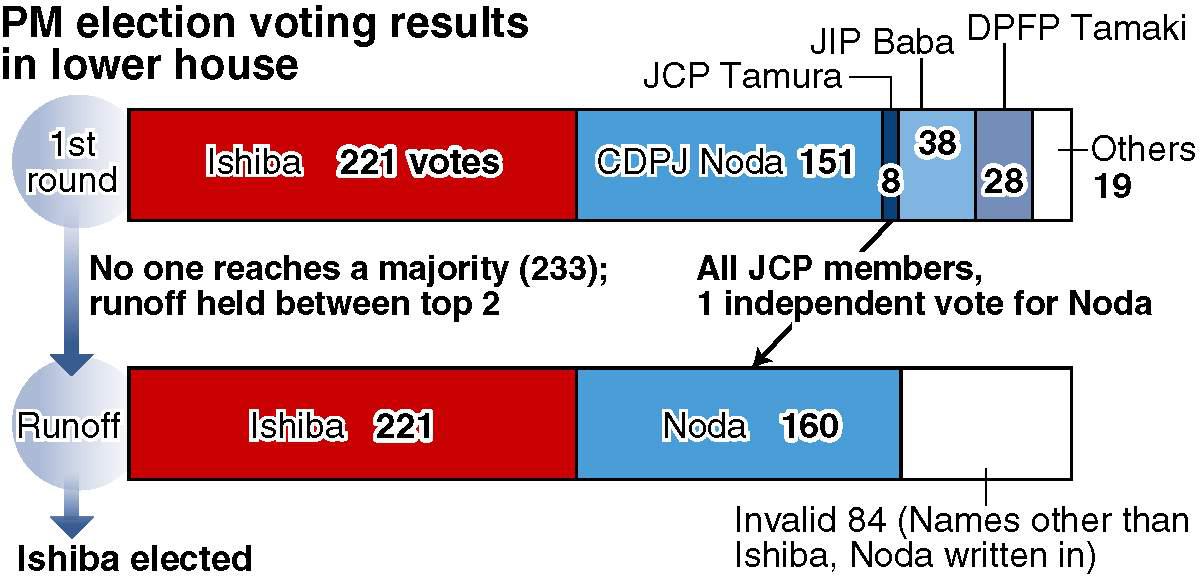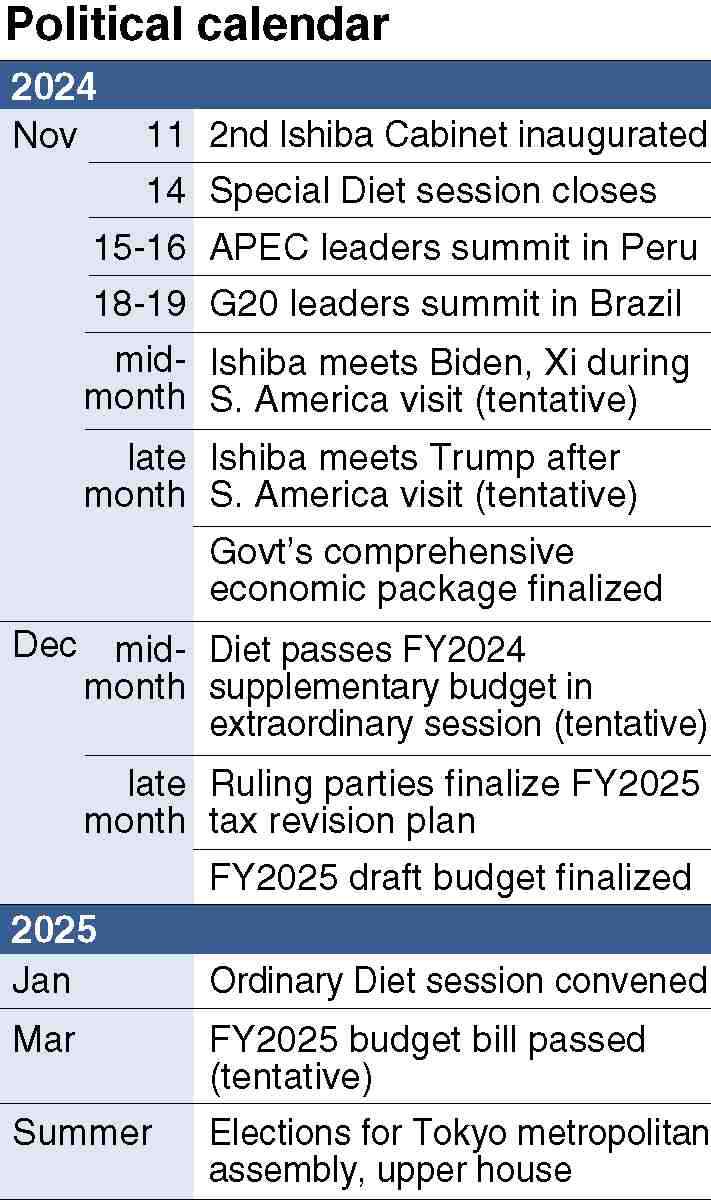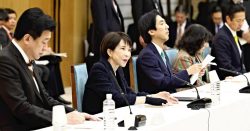PM Ishiba’s Minority Government Walks A Tightrope;Opposition Could Call No-Confidence Vote At Will

Shigeru Ishiba, center, is reelected in the runoff election Monday in the Diet.
17:39 JST, November 12, 2024
Monday’s runoff election in the Diet kept Prime Minister Shigeru Ishiba in office, but it also shed light on the difficulties he faces in managing a minority government going forward.
It was the first prime ministerial runoff in 30 years and only the fifth in history.
With the ruling parties having lost their majority in the Oct. 27 House of Representatives election, Ishiba, the president of the ruling Liberal Democratic Party, survived the runoff thanks to invalid votes cast by members of the Japan Innovation Party and the Democratic Party for the People.
“As a result of the runoff, Mr. Shigeru Ishiba is designated as prime minister by the house,” lower house Speaker Fukushiro Nukaga declared at a special Diet session in the lower house Monday. Ishiba stood up from his seat, surrounded by applause, and bowed many times to people around him with no smile on his face.
Of the 221 votes Ishiba earned in the first round of voting, 197 were from a parliamentary group comprising LDP and independent lower house members including Koichi Hagiuda, Yasutoshi Nishimura and Hiroshige Seko, all of whom won seats in the last general election as independents, and 24 from the LDP’s coalition partner Komeito. In the runoff, Ishiba received the same 221 votes as in the first round of voting.
Constitutional Democratic Party of Japan leader Yoshihiko Noda gathered a total of 151 first-round votes: 149 from a parliamentary group comprising the CDPJ and independent lower house members, and two from independent lawmakers outside the group, Jin Matsubara and Hayato Nakamura. In the runoff, Noda earned an additional nine votes, eight from the Japanese Communist Party and one from Nobuyuki Fukushima, who belongs to a parliamentary group of independent lower house members called Yushi no Kai. However, this gave him a total of only 160, so he lost to Ishiba in the runoff.
Ishiba managed to win the close runoff mainly because members of the JIP and the DPFP, the second and third largest opposition parties, and other opposition parties voted for their respective party leaders. In the runoff, votes are invalid if names other than those of the top two candidates in the first round of voting are written on them. For that reason, there were 84 invalid votes, which resulted in helping Ishiba win the runoff election.
However, the number of votes Ishiba gained in the runoff remained unchanged at 221. Regarding this, Noda told reporters at the Diet Building, “Since Ishiba failed to receive a majority [of 233 votes] in the runoff, he will face many difficulties in managing the government.”
A former cabinet member in the LDP said, “We are faced by a reality in which we will not be able to pass a single budget or bill without the cooperation of opposition parties and a no-confidence motion against the government can be passed if all opposition parties cooperate with each other.”

Hurdles
For Ishiba, the first hurdle is the debate on a supplementary budget for fiscal 2024, which includes additional economic measures. He will be quickly driven into a corner if the supplementary budget is not passed during an extraordinary Diet session to be convened later this year.

As for the DPFP, with which Ishiba hopes to cooperate, the LDP and the party are currently discussing reviewing the so-called ¥1.03 million barrier, referring to the threshold above which annual income is subject to income tax. Raising this threshold would effectively increase workers’ after-tax income. Some members of the government and ruling parties are cautious because such a move would greatly reduce government revenue, so it might be difficult to reach agreement on this issue.
“We will not help prolong the life of Ishiba’s Cabinet. If they do not carefully listen to the opinions of opposition parties, they will come to a deadlock easily,” DPFP leader Yuichiro Tamaki said. Given his strong attitude, Tamaki is unlikely to compromise easily with the ruling parties.
Members of the JIP, which has shown a fair and just attitude in dealing with Diet affairs, are increasingly dissatisfied with the LDP’s handling of political reforms during the previous Diet session. JIP leader Nobuyuki Baba said, “We have no intention to cooperate with the LDP.”
Even if the government passes the supplementary budget, it will be more difficult to gain support to pass a budget for fiscal 2025, which the government aims to pass in next year’s ordinary Diet session.
Concerns within the party
Ishiba also faces uncertainty within the LDP as his leadership within the party is deteriorating after the LDP’s major loss in last month’s lower house election. On Monday, the LDP showed unity as all members voted for Ishiba and there were no dissenters. However, a certain number of “anti-Ishiba” members exist within the party and they may emerge before the House of Councillors election next summer.
“Many members do not think Ishiba should continue to be in the position. For now, they just choose not to show an intraparty conflict to those outside the party,” a young lawmaker who is a former member of the Abe faction said.
Related Tags
Top Articles in Politics
-

Japan PM Takaichi’s Cabinet Resigns en Masse
-

Sanae Takaichi Elected Prime Minister of Japan; Keeps All Cabinet Appointees from Previous Term
-

Japan’s Govt to Submit Road Map for Growth Strategy in March, PM Takaichi to Announce in Upcoming Policy Speech
-

LDP Wins Historic Landslide Victory
-

LDP Wins Landslide Victory, Secures Single-party Majority; Ruling Coalition with JIP Poised to Secure Over 300 seats (UPDATE 1)
JN ACCESS RANKING
-

Producer Behind Pop Group XG Arrested for Cocaine Possession
-

Japan PM Takaichi’s Cabinet Resigns en Masse
-

Man Infected with Measles Reportedly Dined at Restaurant in Tokyo Station
-

Israeli Ambassador to Japan Speaks about Japan’s Role in the Reconstruction of Gaza
-

Videos Plagiarized, Reposted with False Subtitles Claiming ‘Ryukyu Belongs to China’; Anti-China False Information Also Posted in Japan



























